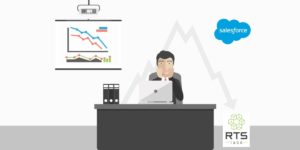Taking the leap and investing in Salesforce for your sales, biz dev and CRM is exciting! You’ve done your research. You know it’s a solid tool, and you’re 100% sure it will help your sales reps and increase overall sales. There’s just one small problem: Your sales reps won’t use it.
We know. It’s frustrating. Not to mention that it defeats the purpose of having it in the first place.
“Salesforce is not just about flipping a switch and turning on a cool new toy. To get the most out of it, and to see the best benefits to your company, you need to adapt your operations, your day-to-day processes, your decisions — and use Salesforce to help define and track your goals.”
~ Keren Stanley | Salesforce Blog | 5 Rules That Will Help Your Salesforce Adoption Succeed
But demanding that your sales team use the software is not exactly the answer either. If you want to solve the problem, you need to understand why your team is reluctant to use Salesforce. The three reasons your sales team won’t use Salesforce are:
- They don’t understand how to use it.
- They think they’re being micromanaged.
- They don’t have time (or are unwilling) to change their process.
We’ve seen these scenarios played out multiple times across so many different industries. While it may be frustrating, lack of adoption is usually a sign that your Salesforce implementation left something to be desired. Don’t worry. All hope is not lost! If you want to ensure everyone on your team adopts Salesforce, follow these three tips.
1. Go Back to Basics
Change is hard – especially when it comes to new technology. One of the best ways to ensure your team uses a new tool is to teach them how to use it. We get it. Salesforce is complicated. That’s why training is so important.
You’re not teaching your sales team how to use Microsoft Word. You’re teaching them how to use a powerful, complex sales tool. Training needs to go beyond giving them a tour of their dashboard. Your team needs ongoing training so they have a deep, working knowledge of the the tool. Salesforce Trailhead is a great, module-based training tool that will teach users at their own pace. No classroom setting needed!
In addition to training, you should also have a Salesforce Admin. Salesforce Admins are in charge of the implementation process, training, and maintaining your Salesforce Org. If users are having trouble, or if something goes wrong, your Salesforce Admin is charged with swooping in to save the day. They are the force that drives Salesforce success. Don’t have a Salesforce Admin yet? Read this article for tips on getting a superstar Salesforce Admin.
2. Give Them the “Why”
Announcing a change and mandating adoption of said change is not the best way to get everyone on board and gain their buy-in and trust. “Because I said so” works just about as well as when you use it on your kids, so don’t use it on perfectly capable adults.
You’ve got to tell them why you chose to implement Salesforce. Tell them “what’s in it for them.” Sell them! Show them all the ways Salesforce is going to make their jobs easier – and help them close more and bigger deals.
Have you told them how their dashboard will give them all the data they need at their fingertips to keep up with all their leads and know the right time to go in for the close – not to mention how to cross sell them and track their orders? Did you go over how its CRM can streamline the sales process and actually make it easier?
Did you tell them it will give them the freedom to do their job from any device, any where, at any time?
Preach! Show them how much value the tool has and get them excited about using it!
3. Re-evaluate Your Salesforce Implementation
Implementing Salesforce is more than just installing the software. You can’t just turn it on, sit back, and reap the rewards. You’ve got to lay out your business processes, develop a plan, set-up dashboards for the different roles in your company, and then train everyone on how to use the tool. It’s a serious process that cannot be done haphazardly – not if you expect to get your full ROI. It’s takes time, energy, and forethought.
A telltale sign that you didn’t implement Salesforce correctly is lack of adoption. If your sales processes and workflows don’t align with your Salesforce implementation, you’re actually hurting your sales reps more than you’re helping them.
If you need to go back and do additional training with your employees – in whatever roles they fulfill – that’s fine. Help them get exactly what they need out of Salesforce, from a clearer overview of the sales process to order tracking and fulfillment information. Once everyone understands how to get what they need and want out of Salesforce, then they’ll more readily adopt the system.
Read: 6 Common Salesforce Mistake and How to Avoid Them
Take Action
If implementation and training are creating problems for you, we can help! Maybe you didn’t properly plan. Maybe you need to take a closer look at your business processes. Perhaps you need a custom-coded Salesforce solution over the out-of-the-box solution you’ve chosen. Want to know more? Download our Salesforce customization whitepaper below!






